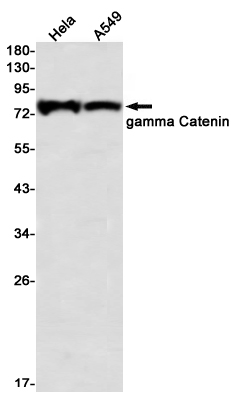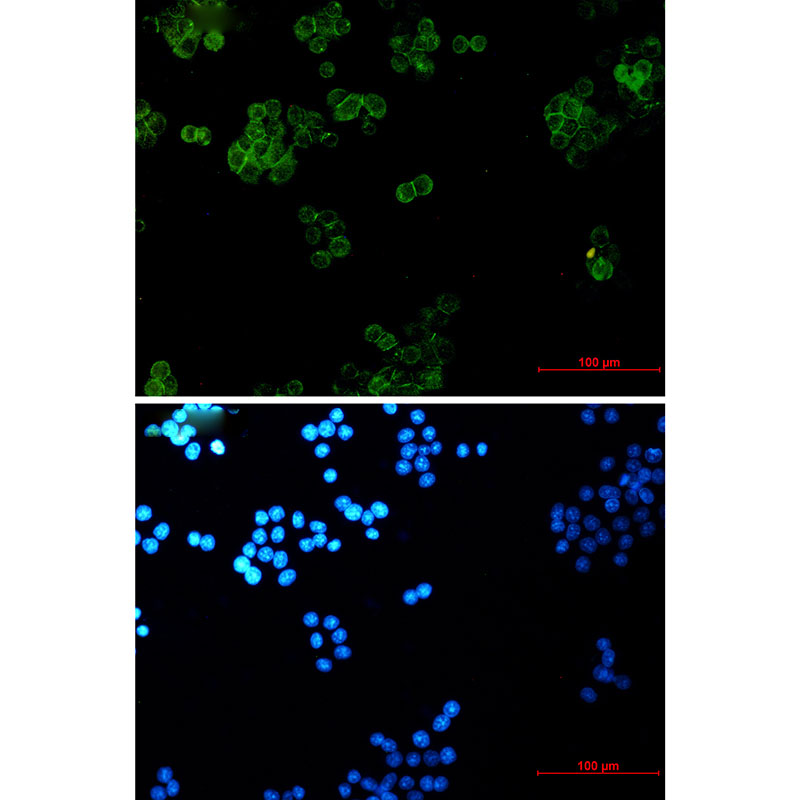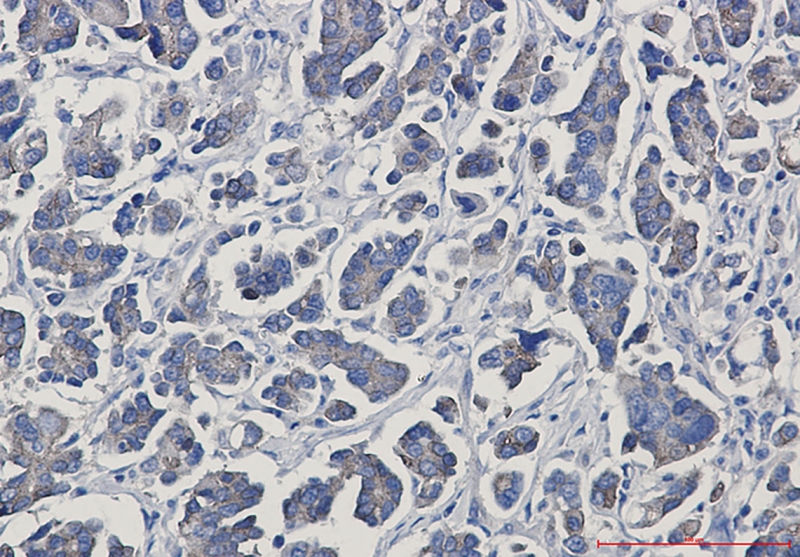


| WB | 1/500-1/1000 | Human,Mouse,Rat |
| IF | 咨询技术 | Human,Mouse,Rat |
| IHC | 1/50-1/100 | Human,Mouse,Rat |
| ICC | 1/50-1/200 | Human,Mouse,Rat |
| FCM | 咨询技术 | Human,Mouse,Rat |
| Elisa | 咨询技术 | Human,Mouse,Rat |
| Aliases | JUP; CTNNG; DP3; Junction plakoglobin; Catenin gamma; Desmoplakin III; Desmoplakin-3 |
| Entrez GeneID | 3728 |
| WB Predicted band size | Calculated MW: 82 kDa; Observed MW: 82 kDa |
| Host/Isotype | Rabbit IgG |
| Antibody Type | Primary antibody |
| Storage | Store at 4°C short term. Aliquot and store at -20°C long term. Avoid freeze/thaw cycles. |
| Species Reactivity | Human |
| Immunogen | Recombinant protein of human gamma Catenin |
| Formulation | Purified antibody in TBS with 0.05% sodium azide,0.05%BSA and 50% glycerol. |
+ +
以下是关于γ-Catenin(Junction Plakoglobin)抗体的参考文献及其摘要概括:
1. **文献名称**: "A monoclonal antibody specific for junctional plakoglobin (γ-catenin)"
**作者**: Mertens C, et al.
**摘要**: 该研究开发了一种针对γ-Catenin的单克隆抗体,验证了其在多种细胞系中的特异性,并用于免疫荧光和Western blot分析,揭示了其在细胞间黏附连接中的定位。
2. **文献名称**: "γ-Catenin-dependent regulation of cell-cell adhesion and signaling in squamous carcinoma cells"
**作者**: Williamson L, et al.
**摘要**: 通过使用γ-Catenin抗体进行免疫沉淀和免疫印迹,研究发现γ-Catenin缺失会破坏细胞间黏附并激活促癌信号通路,提示其在肿瘤进展中的双重作用。
3. **文献名称**: "Characterization of γ-catenin expression in human tissues using a novel antibody"
**作者**: Kim S, et al.
**摘要**: 该文献报道了一种新型多克隆抗体的开发,通过免疫组化分析发现γ-Catenin在表皮、心肌等组织中高表达,且与细胞分化状态相关。
4. **文献名称**: "Loss of γ-catenin promotes metastasis in triple-negative breast cancer"
**作者**: Patel R, et al.
**摘要**: 利用γ-Catenin抗体进行组织芯片分析,发现其低表达与乳腺癌转移和不良预后显著相关,机制涉及上皮-间质转化(EMT)的激活。
这些研究均明确涉及γ-Catenin抗体的实验应用,涵盖抗体开发、蛋白功能分析及临床相关性探索。
Gamma catenin, also known as junction plakoglobin (JUP), is a member of the armadillo protein family and shares structural and functional similarities with β-catenin. It plays dual roles in cellular adhesion and signaling. As a component of desmosomes and adherens junctions, it bridges cadherins (e.g., E-cadherin) to the cytoskeleton, maintaining tissue integrity and intercellular adhesion. In signaling, γ-catenin participates in Wnt signaling pathways, though its role is less defined compared to β-catenin. It can translocate to the nucleus, interact with transcription factors like TCF/LEF, and modulate gene expression linked to cell proliferation, differentiation, and apoptosis. Dysregulation of γ-catenin is implicated in cancers, cardiovascular diseases, and skin disorders. For instance, reduced expression correlates with tumor metastasis, while mutations are linked to arrhythmogenic cardiomyopathy.
Gamma catenin antibodies are essential tools for studying its localization, expression levels, and interactions in normal and diseased tissues. They are widely used in techniques like Western blotting, immunofluorescence, and immunohistochemistry. These antibodies help elucidate γ-catenin's context-dependent roles, particularly its tumor-suppressive or oncogenic behavior in different cancers. Validated antibodies specifically distinguish γ-catenin from β-catenin, ensuring accurate detection. Researchers also employ them to explore crosstalk between cell adhesion and signaling pathways, offering insights into therapeutic targets for diseases involving γ-catenin dysfunction. Host species (e.g., rabbit, mouse) and clonality (monoclonal/polyoclonal) vary, with applications tailored to experimental needs.
×